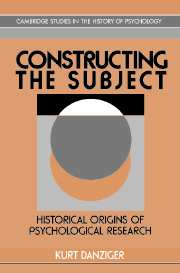Book contents
- Frontmatter
- Contents
- Preface
- 1 Introduction
- 2 Historical roots of the psychological laboratory
- 3 Divergence of investigative practice: The repudiation of Wundt
- 4 The social structure of psychological experimentation
- 5 The triumph of the aggregate
- 6 Identifying the subject in psychological research
- 7 Marketable methods
- 8 Investigative practice as a professional project
- 9 From quantification to methodolatry
- 10 Investigating persons
- 11 The social construction of psychological knowledge
- Appendix
- Notes
- Index
8 - Investigative practice as a professional project
Published online by Cambridge University Press: 18 September 2009
- Frontmatter
- Contents
- Preface
- 1 Introduction
- 2 Historical roots of the psychological laboratory
- 3 Divergence of investigative practice: The repudiation of Wundt
- 4 The social structure of psychological experimentation
- 5 The triumph of the aggregate
- 6 Identifying the subject in psychological research
- 7 Marketable methods
- 8 Investigative practice as a professional project
- 9 From quantification to methodolatry
- 10 Investigating persons
- 11 The social construction of psychological knowledge
- Appendix
- Notes
- Index
Summary
Interpreting the professional project
The previous chapters have provided abundant evidence for the fact that the historical development of psychological research practice did not proceed along a single track. At the very least, there were two different lines of development. By the 1920s the Wundtian style of experimentation, with its roots deep in the philosophical and scientific traditions of the nineteenth-century German university, seemed to constitute a deteriorating research program within American psychology. As it was fast losing its appeal for all but a few practitioners, the Galtonian research program, strongly linked to practical rather than academic concerns from the beginning, was moving from strength to strength. Not only was it extending its appeal with every passing year, but, as we have seen, it proved itself capable of generating exciting methodological innovations that promised to extend the scope of scientific psychology far beyond what had hitherto been thought possible.
We have also seen that the galloping success of the Galtonian program was in no small measure due to its very direct link to the demands of a significant extradisciplinary market for its products. Nevertheless, it would be a mistake to see the development of a certain style of investigative practice as an essentially passive adaptation to external social requirements. That might have been true of certain individuals, but it was not true of the response of the discipline as a whole. Even on an individual level most practitioners recognized that practical successes would be short lived if they threatened to undermine the prestige of the disciplinary enterprise they represented.
- Type
- Chapter
- Information
- Constructing the SubjectHistorical Origins of Psychological Research, pp. 118 - 135Publisher: Cambridge University PressPrint publication year: 1990



